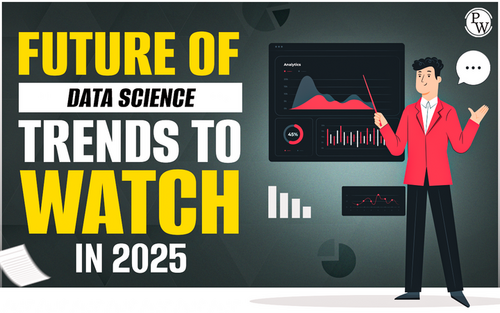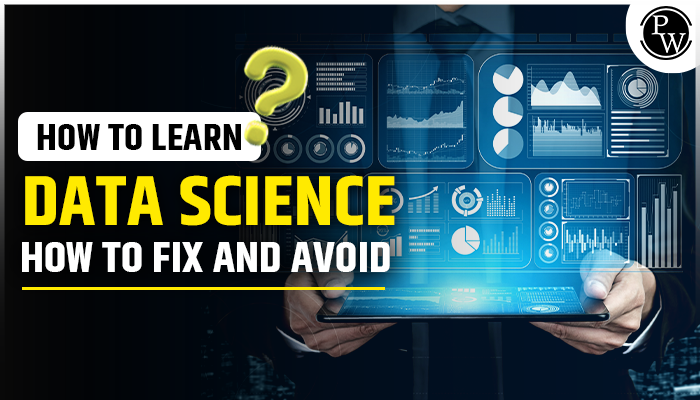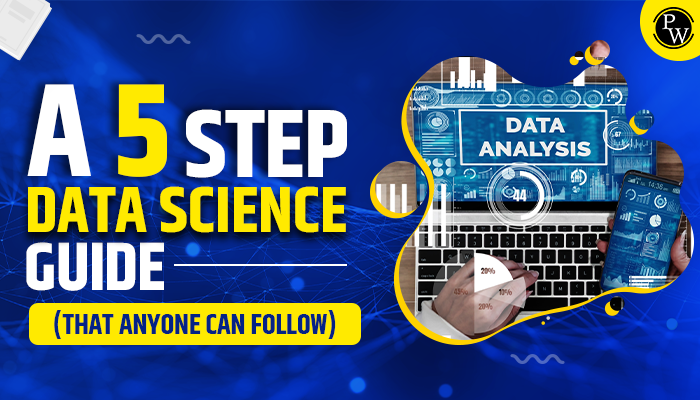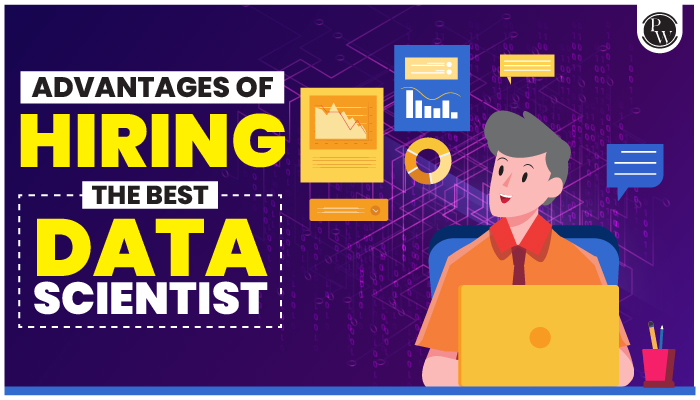Future of Data Science: In the era of big data, data science has emerged as a powerful force driving innovation across various industries. Defined as the interdisciplinary field that uses scientific methods, processes, algorithms, and systems to extract insights and knowledge from structured and unstructured data, data science has become an integral part of decision-making processes.
As we stand at the cusp of 2025, it’s crucial to explore the future trends shaping the data science landscape. In this blog, we’ll talk about the future of Data Science, careers in data science, road to becoming a data scientist and more!
If you want to secure a high-paying job in the field of data science, a Full-Stack Data Science Course is highly recommended!
Data Science’s Contribution to the Future

Data science wields transformative power across industries. In healthcare, finance, marketing, and manufacturing, it propels better decisions, heightened efficiency, and innovative solutions. Analysing vast datasets provides valuable insights, optimising processes and ensuring a competitive edge. Data science’s impact is poised to deepen across diverse sectors. In healthcare, it will shape personalised medicine, optimise treatments, and predict disease outbreaks. Likewise, in finance, it refines risk assessments, fortifies fraud detection, and enhances customer experiences. Crucially, data science empowers decision-makers by offering real-time analysis for strategic choices and improved outcomes. As we advance, integrating artificial intelligence (AI) and machine learning (ML) into data science will amplify predictive analytics and decision support systems.
Also read: Top 5 Programming Languages for Data Scientists in 2024
The Road to Becoming a Data Scientist
Today’s job market values data science—a dynamic, sought-after field. The growing reliance on data-driven choices increases the need for skilled data scientists. To succeed in this realm, aspiring data scientists must understand the necessary skills, educational paths, and emerging trends.
Skill Set Required for Data Scientists
Analytical Thinking
Core to a data scientist’s skill set is analytical thinking. The ability to break down intricate problems, create hypotheses, and systematically analyse data for meaningful insights is crucial. This skill demands logical reasoning, attention to detail, and a structured problem-solving approach.
Statistical Proficiency
A strong foundation in statistics is crucial for data scientists. From hypothesis testing to regression analysis, statistical techniques form the basis for deriving meaningful conclusions from data. Data scientists use statistical methods to identify patterns, make predictions, and validate the reliability of their findings.
Programming Skills
Mastery of programming languages is essential. Python and R, widely used in data science, enable data manipulation, analysis, and the application of machine learning algorithms. A data scientist should be comfortable writing code to clean, pre-process, and analyse data efficiently.
Data Visualization
Data scientists must be skilled in translating complex data analyses into accessible and visually compelling insights. Data visualisation tools, such as Tableau or Matplotlib in Python, enable data scientists to create charts, graphs, and interactive dashboards that effectively communicate their findings to non-technical stakeholders.
Communication Skills
Data scientists must possess effective communication skills. The capability to explain technical discoveries to a non-technical audience is vital. This ensures that data-driven insights influence decision-making throughout the organisation. Whether in written reports, presentations, or collaborative discussions, data scientists must articulate their findings clearly and persuasively.
Critical and Creative Thinking
The ability to think critically and creatively sets exceptional data scientists apart. Data science often involves addressing complex problems for which conventional solutions may not apply. Creative thinking allows data scientists to explore innovative approaches, while critical thinking ensures the rigorous evaluation of methodologies and results.
Educational Background and Qualifications
Diverse Educational Paths
Becoming a data scientist follows diverse paths, welcoming those with different educational backgrounds. Some possess degrees in:
- Computer science
- Mathematics
- Statistics
On the other hand, others emerge from fields like
- Physics
- Engineering
- Economics
Traditional Academic Programs
Universities offer specialised data science programs at both undergraduate and graduate levels. These programs cover statistics, machine learning, data visualisation, and programming. A data science degree establishes a solid foundation, often involving practical projects and internships.
Specialized Certifications
Certifications from reputable organisations can enhance a data scientist’s qualifications. Certifications in specific programming languages (e.g., Python or R), machine learning frameworks (e.g., TensorFlow or PyTorch), or specialised domains (e.g., healthcare analytics or financial modelling) demonstrate expertise in particular areas of data science.
Emerging Trends in Data Science Education
Hands-On Experience
The evolution of data science education emphasises the importance of hands-on experience. Real-world projects and case studies allow students to apply theoretical concepts to practical scenarios. These experiences not only enhance technical skills but also prepare aspiring data scientists for the challenges they will encounter in the workforce.
Interdisciplinary Approach
Data science is inherently interdisciplinary, pulling insights from computer science, mathematics, and specific domains. Modern education trends stress a holistic approach, merging these diverse elements. Students are urged to collaborate across disciplines, nurturing a profound grasp of the intricate challenges data science confronts.
Lifelong Learning
The field changes a lot, so lifelong learning is a must. As technology grows and new tools come up, data scientists need to keep up with what’s new. Staying in the loop through online courses, workshops, or conferences is key to staying important and skilled in the always-changing world of data science.
Data Science Careers
There’s a big need for skilled data scientists these days, making it a top field in the job market. Data scientists are crucial, uncovering hidden insights in big datasets and influencing big decisions to shape industries worldwide.
Diverse Job Opportunities in Data Science
Data science offers a vast array of job opportunities, reflecting the multidisciplinary nature of the field. Here are some key roles within the data science spectrum:
- Data Analyst: Data analysts focus on interpreting and analysing data to provide actionable insights. They work with statistical techniques and tools to uncover trends, patterns, and correlations.
- Data Scientist: A broader role, data scientists employ a combination of statistical analysis, machine learning, and programming to extract insights from data. They are often responsible for designing and implementing complex algorithms.
- Machine Learning Engineer: Specialising in machine learning, these professionals design and implement machine learning models. They work on developing algorithms that allow systems to learn and improve from experience.
- Business Intelligence Analyst: Focused on transforming data into actionable intelligence, business intelligence analysts create visualisations and reports to aid in decision-making. They often work with business leaders to understand data-driven requirements.
- Data Engineer: Data engineers are responsible for constructing the infrastructure necessary for generating insights from large datasets. They design, develop, and maintain the architecture for data generation, transformation, and storage.
- Big Data Engineer: With a focus on handling and processing large volumes of data, big data engineers design and implement systems to manage and analyse massive datasets.
- Data Architect: Data architects develop the overall structure of data solutions, ensuring that they align with business goals and are scalable. They design databases, data lakes, and other storage solutions.
Industry-specific Roles in Data Science
Data science’s application varies across industries; diverse sectors demand distinct skills and expertise. Consider these industry-tailored roles:
- Healthcare Data Scientist: Within healthcare, these professionals aid in clinical research, analyse patient outcomes, and construct predictive models for disease diagnosis and treatment.
- Financial Analyst: Data scientists in finance concentrate on tasks such as risk assessment, fraud detection, algorithmic trading, and enhancing customer experience.
- Marketing Analyst: Marketing analysts leverage data to understand consumer behaviour, optimise marketing strategies, and measure the effectiveness of campaigns.
- E-commerce Data Scientist: In e-commerce, professionals analyse customer data to enhance user experience, optimise product recommendations, and predict trends in consumer behaviour.
- Manufacturing Data Scientist: Data scientists in manufacturing work on predictive maintenance, quality control, and supply chain optimization to improve operational efficiency.
Understanding the nuances of each industry is essential for data scientists to tailor their skills and approaches to meet specific challenges and goals.
Challenges and Opportunities in Data Science Careers
Data science careers provide exciting opportunities, yet they pose challenges. Keeping up with swiftly evolving technologies, like new programming languages and machine learning frameworks, is a constant hurdle. The interdisciplinary nature of data science demands both technical prowess and effective communication skills.
Challenges:
- Continuous Learning: The rapid pace of technological advancements demands continuous learning to stay relevant in the field.
- Interdisciplinary Skills: Data scientists need to bridge the gap between technical expertise and effective communication to convey complex findings to non-technical stakeholders.
- Ethical Considerations: As data science becomes more pervasive, ethical considerations regarding privacy, bias in algorithms, and responsible use of data pose challenges that professionals must navigate.
Opportunities:
- Innovation: Challenges present opportunities for innovation. Data scientists have the chance to develop creative solutions to complex problems, driving positive change in their respective industries.
- Positive Societal Impact: Through data-driven insights, professionals can contribute to solving societal challenges, such as healthcare optimization, environmental sustainability, and social justice.
- Diverse Career Paths: The multidisciplinary nature of data science allows professionals to explore diverse career paths within and across industries.
Navigating the Job Market
The job market for data science professionals is dynamic and competitive. Here are some strategies for navigating a successful career in data science:
- Build a Solid Foundation: Establish proficiency in statistics, mathematics, and programming languages like Python and R.
- Specialise: Stand out in the job market by specialising in a specific data science area, such as machine learning, natural language processing, or big data.
- Gain Hands-on Experience: Employers highly value practical experience, so engage in internships, personal projects, or data science competitions.
- Continuous Learning: Stay current with the latest tools, techniques, and industry trends. Enrol in courses, attend conferences, and join online forums to stay connected with the data science community.
- Network: Forge a robust professional network by attending industry events, participating in online communities, and connecting with field professionals.
- Communication Skills: Hone effective communication skills to convey intricate findings clearly to both technical and non-technical audiences.
Also Check: Free Data Science Courses: A Certificate Guide for 2024
The Role of AI and Machine Learning in Data Science
The interdependence of data science, AI, and machine learning is more evident. AI and ML algorithms help data scientists analyse intricate data, recognize patterns, and predict on a large scale. Looking ahead to 2025, combining AI and ML technologies will be crucial for enhancing data science capabilities.
Current Applications and Future Prospects
AI and ML are presently applied in data science for tasks like sentiment analysis through natural language processing and image recognition via computer vision. Future trends indicate an expansion into autonomous systems, reinforcement learning, and explainable AI. The capacity to derive useful insights from extensive datasets will drive innovation in various industries.
Ethical Considerations in AI and Machine Learning
The increased reliance on AI and ML also raises ethical concerns. Bias in algorithms, lack of transparency, and the potential for job displacement are among the challenges that need to be addressed. The responsible development and deployment of AI and ML technologies will be crucial in ensuring that these tools contribute positively to society without compromising ethical principles.
Future of Data Science in 2025
Emerging Technologies Shaping the Landscape
Quantum computing, able to handle massive data simultaneously, may transform data analysis. Edge computing, processing data nearer to the source, boosts speed and efficiency, altering how we process data.
Predictions for the Future of Data Science
Predicting the exact trajectory of data science is challenging, but certain trends are likely to dominate. Increased automation of routine tasks, enhanced data security measures, and the development of more sophisticated algorithms are among the predictions. The democratisation of data science tools, making them accessible to individuals with non-technical backgrounds, is also expected to gain momentum.
Global Trends and Market Projections
Globally, the need for data scientists is expected to rise, with developing economies such as India playing a pivotal role in shaping the field. As organisations globally acknowledge the strategic significance of data, investments in data science capabilities are anticipated to grow, leading to a lively and dynamic market.
Future of Data Science and Artificial Intelligence
Synergy between Data Science and AI
The synergy between data science and AI is a driving force behind technological advancements. AI algorithms rely on robust data analysis, and data science benefits from the automation and predictive capabilities of AI. This collaboration will lead to more sophisticated applications, from personalised recommendations to autonomous decision-making systems.
Impact on Innovation and Technology
The combined forces of data science and AI are poised to drive innovation across industries. In healthcare, we can anticipate breakthroughs in disease diagnosis and treatment planning. In manufacturing, predictive maintenance powered by AI-driven analytics will enhance efficiency and reduce downtime. The intersection of data science and AI will continue to be a catalyst for technological advancements, opening new frontiers of possibility.
Ethical and Societal Implications
As data science and AI become increasingly integrated into our daily lives, ethical considerations become paramount. Issues of privacy, algorithmic bias, and job displacement need to be addressed proactively. Society must engage in conversations about the responsible use of these technologies, and policymakers play a crucial role in establishing guidelines that ensure ethical and equitable practices.
Future of Data Science in India
Data Science Landscape in India
India has emerged as a significant player in the global data science landscape. With a growing pool of skilled professionals and a robust IT infrastructure, the country is well-positioned to capitalise on the opportunities presented by data science. Indian organisations are increasingly leveraging data analytics to gain a competitive edge in the global market.
Growth Opportunities and Challenges
The future of data science in India holds tremendous growth opportunities. The government’s initiatives to promote digital literacy and skill development align with the rising demand for data science professionals. However, challenges such as the need for continuous upskilling, addressing the urban-rural divide, and ensuring data security must be navigated to unlock the full potential of data science in India.
Government Initiatives and Policies
Government initiatives and policies play a crucial role in shaping the trajectory of data science in India. Investments in education, research and development, and the creation of a supportive regulatory environment are essential for fostering innovation and growth in the field. Collaboration between the government, academia, and industry will be key to building a robust data science ecosystem.
Must Read: Best Tips To Prepare For A Data Science Career In 2024
Conclusion
In conclusion, the future of data science is poised for exciting developments and transformative impacts. As we navigate the complexities of emerging technologies, ethical considerations, and global market dynamics, the role of data scientists will become increasingly critical. The integration of AI and machine learning, coupled with the evolving data science landscape in India and beyond, paints a picture of a future where data-driven decision-making becomes the norm rather than the exception. As we embrace this future, the key lies in responsible innovation, continuous learning, and a commitment to leveraging data science for the betterment of society.
Embark on a journey to becoming a data science expert with PW Skills. Enroll in PW Skills Full Stack Data Science Pro course today and unlock a world of opportunities in the exciting field of data science. Enroll Now!
FAQs
How can data scientists contribute to social impact?
Data scientists can contribute to social impact by applying their skills to address societal challenges. For instance, in healthcare, they can work on projects related to disease prevention, improving healthcare accessibility, and optimising resource allocation. In other areas, such as environmental sustainability and social justice, data-driven insights can drive positive change and contribute to a better society.
What role does storytelling play in data science careers?
Storytelling is a crucial aspect of data science careers as it involves presenting complex findings in a compelling and understandable way. Data scientists need to communicate their insights effectively to both technical and non-technical stakeholders. Developing strong storytelling skills ensures that the impact of data analysis is maximised, influencing decision-makers and driving positive outcomes.
How is the role of data engineers different from that of data scientists?
While data scientists focus on extracting insights from data through analysis and modelling, data engineers are responsible for constructing and maintaining the infrastructure needed for data processing. Data engineers design systems for data generation, transformation, and storage, ensuring the availability of high-quality data for data scientists to work with.
What are the emerging technologies influencing the future of data science careers?
Emerging technologies such as quantum computing and edge computing are expected to shape the future of data science. Quantum computing's ability to process vast amounts of data simultaneously and edge computing's capability to process data closer to the source are poised to revolutionise data analysis, offering new possibilities and challenges for data scientists.
How do data scientists address ethical considerations in their work?
Data scientists address ethical considerations by adopting responsible practices throughout the data science lifecycle. This includes being aware of and mitigating bias in algorithms, ensuring privacy compliance, and transparently communicating the limitations and implications of their findings. Ethical considerations are integral to maintaining trust and integrity in the field of data science.




